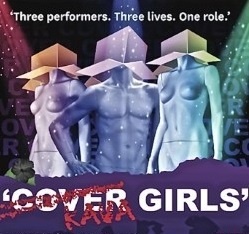KAVA GIRLS
Spotlites @ The Merchants' Hall, Edinburgh, Scotland
10/08/2014 - 25/08/2014
Production Details
Sinalei is a young Fa’afafine (a Samoan male who lives as female) who has just landed her first job in a West End show, People Are Intimidated By My Lipstick. She shares the understudying twilight with the gutsy Salma and the cucumber cool Debra.
Three performers, three lives, one role.
Kava Girls is a new play by Sani Muliaumaseali’i with original songs about dreams, hopes and the uneasy road to stardom. ‘Witty and intensely powerful – there’s nothing else quite like this!’ (Origins Festival Review of Gafa: A Family Called Samoa, 2012). www.gafasamoa.com
Spotlites @ The Merchants’ Hall (Venue 278)
16:05
Aug 10 – 25
45 minutes
Suitability: 14+ (Guideline)
Country: Samoa
Group: GAFA Arts Collective (GAC)
Warnings: Some strong language. Strobe lighting. Partial nudity.
Genuinely interesting, extremely relevant, needs work
Review by Dione Joseph 27th Aug 2014
London may be almost 24 hours away from Auckland but right in the heart of the imperial centre the first Samoan Arts Collective GAFA (pronounced Nga-fah, and meaning genealogy in Samoan) is causing more than a few waves.
Founded in 2011 this cross-cultural and cross disciplinary group of artists brings KAVA GIRLS to Edinburgh for their Fringe debut and although set in a small room, this is a little show with big dreams.
Written and directed by Sani Muliaumaseali’i this is the Samoan story of three talents wanting to make it big on London’s West End. At the moment, however, they’re all cover girls. There’s the seasoned starlet and limelight addict Debra (Ninotchka Tingleff), the hopeful and focused Salma (Olivia Muliaumaseali’i) and latest arrival, fa’afafine and fresh-off-the-boat from Samoa: Sinalei (A J Leroy).
In the cluttered and tiny dressing room this trio explore the uncomfortable readjustment from the world of Samoa to the demands and pressures of the West End stage. A very ambitious attempt to examine the various ‘performances’ (for example the Ava ceremony) and the sacred space of the stage within a neo-colonial world, Kava Girls must be applauded for striving to invoke a rarely seen exploration of Samoan culture colliding with the colonial framework. In addition, it does so outside the Samoan-New Zealand framework one that is vital, if not essential, to the relationship between Samoa (and the Samoan population) in New Zealand and Samoan culture on the international stage.
The work itself however needs extensive development. Still its embryonic stage the script needs considerable re-writing and possibly a complete re-working of the stage direction. Cramped into a tiny space, the set is a cluttered dressing room littered with cardboard boxes, various Samoan cultural motifs and clunky chairs, none of which in their awkward juxtaposition make for an appealing aesthetic.
While the voices of all three performers are good, the score itself could be developed to give them a wider range to really soar and unfortunately the lyrics, while sweet, are somewhat forgettable. As a result, despite occasional moments of exceptional vocality, the cast of three give stilted performances that are most prominent between the awkward segues of singing and speaking.
Choreography, once again constrained by the space, is less than average, yet to their credit and despite all the areas that need to be improved, all three performers are enthusiastic and their energy, particularly on closing night, is laudable in itself.
This is a production that has at its core a genuinely interesting subject to explore and with its talented cast (and new versions of script and better staging) Kava Girls could be a story on a universal level. Work of this kind is extremely relevant in conversations today, but it urgently needs attention and development to take it from its current emerging stage to a fully-fledged cross-genre experience that will truly do justice to Muliaumaseali’i’s story.
Copyright © in the review belongs to the reviewer





Comments